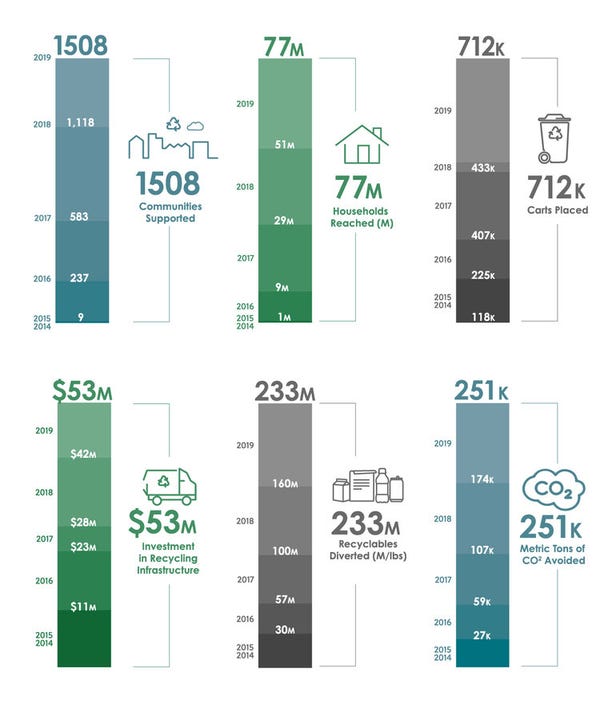The Recycling Partnership Releases Annual Impact Report, Addresses COVID-19 Recovery

The Recycling Partnership, a national nonprofit organization that leverages corporate partner funding to transform recycling, recently released its 2020 Impact Report, showing how The Partnership has affected recycling in the U.S. since 2014.
Released annually, the Impact Report contains measurement of the collective impact of the Asheville, N.C.-based organization’s work.
“Not surprisingly, but something we are proud of, since our organization’s inception, we’ve successfully catalyzed $91 million of investment in the recycling system,” says Samantha Kappalman, vice president of strategic communications for The Recycling Partnership. “This report represents a celebration of our impacts and begins to frame our strategic focus, which will guide our work for the next 18 months.”
The report highlights how the organization helps more than 1,500 U.S. communities overcome recycling challenges. Since The Recycling Partnership’s inception in 2014, the group has leveraged more than $90 million in impact.

The Partnership also has delivered new recycling carts to more than 700,000 U.S. households, avoided 251,000 metric tons of carbon emissions, reached more than 77 million households nationwide, and diverted more than 230 million pounds of recyclables from landfills into the recycling stream in the last six years.
Some of the households reached were in Ohio, where, over the last year, The Partnership worked with the Ohio Environmental Protection Agency to reduce contamination in five pilot communities. As a result, those communities reduced contamination by 40% and increased the value of cleaner recyclables by $20 per ton.
“We thank The Recycling Partnership and our pilot cities in Ohio for their efforts and partnership to improve how Ohioans recycle,” Ohio EPA Division of Materials and Waste Management Chief Vlad Cica said in a statement. “Improving and increasing education, along with other interventions like working street-to-street, help us all to recycle better and show our communities why recycling matters.”
The Recycling Partnership’s strategy for the next 18 months will focus on implementing smarter systems across the value chain, along with continuing to unlock supply of recyclable materials from communities, reducing contamination in local recycling systems, sparking innovation through material collaboratives to make more items commonly recycled, and working with elected leaders to ensure an even playing field for recycling and plans for improved infrastructure.
The current COVID-19 crisis has underscored the essential nature of the material supply stream initiated through community collection programs. The Partnership is advocating for transformative policy to ensure comprehensive funding that creates and sustains the system of the future.
“We are working with our partners from across the supply chain on how to continue to expand how we unlock supply from community collection programs,” says Kappalman. “As we navigate the impacts of COVID-19 as a nation, one of the tasks ahead is to rebuild a strong U.S. economy in a way that supports people and the planet. Recycling will have a central role to play in the process of rebuilding the U.S. economy.”
The Recycling Partnership’s 2020 Impact Report shows how the organization is working with communities, corporate brands, and other industry-aligned organizations to move the U.S. from a linear economy to a circular economy.
“COVID-19 is addressed directly in the letter from our CEO and fundamentally impacts the way we’ll support communities in the coming months and years,” says Kappalman. “We are working with our community partners for solutions to challenges that have arisen as a result of COVID-19, we've made reference to those challenges throughout the report such as: recycling and solid waste workers following health and safety guidelines; communities not being able to hire new staff; and communities with less automation having to temporarily suspend recycling.”
As the U.S. begins to rebuild following the COVID-19 pandemic, recycling may play an important role in the health of the nation’s economy.
“One of the things I hope we all carry forward from this time of crisis is the perspective and heightened awareness of how we, as humans, collectively impact the Earth – and the responsibility we have to lighten that burden,” Keefe Harrison, CEO, The Recycling Partnership, said in a statement. “The good work of The Recycling Partnership, to create a circular economy and a healthy U.S. recycling system, is now m
About the Author
You May Also Like


.png?width=300&auto=webp&quality=80&disable=upscale)